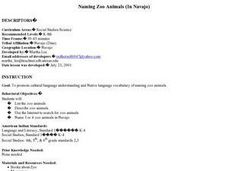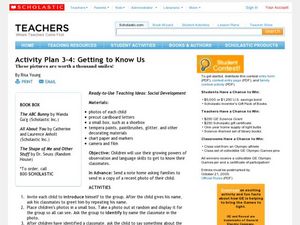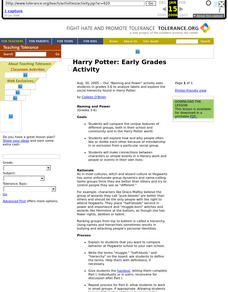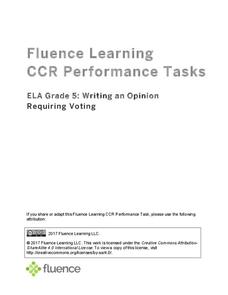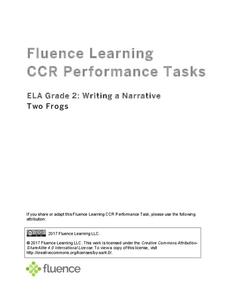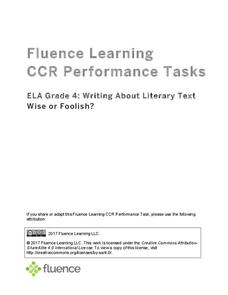Curated OER
Burs in Your Furs
Students explore the concept of animal welfare. In this wild animal habitats lesson, students discover the work of wild animals in sustaining their habitats as they participate in a classroom simulation. Students discuss how wildlife...
Curated OER
Insects: Bugs, Science, Entomology
In this lesson, insects are explored through reading of children's literature, classifying insects versus non-insects, drawing and painting various insects, and learning how to clap to certain rhythms while reciting insect names.
Curated OER
Doctor Mae C. Jemison - First African American Woman in Space
Seventh graders trace and analyze the life of Doctor Mae C. Jemison and the circumstances that enabled Dr. Jemison to achieve her goal of becoming an astronaut. They explore the role of NASA in the development of America's Space Shuttle...
Curated OER
Naming Zoo Animals (In Navajo)
Students investigate zoo animals and name various zoo animals in Navajo. They take a field trip to the zoo, take digital pictures of various animals, conduct research, and name each animal in Navajo.
Curated OER
Globalization: The Garment Industry in Southeast Asia
Students are introduced to the concept of globalization. In groups, they read primary source documents to view sweatshops from different points of view. They write a paper about the impact of globalization on the garment industry and...
Curated OER
Innovations in Obstetrics and Pediatrics
Learners study the history in obstetrics and pediatrics. In this investigative lesson students research and present information about winners of the Nobel Prize.
Curated OER
Bugs, Bugs, Everywhere!
Students collect and compare bugs using magnifying lenses and graph data based on their comparisons. In this bugs lesson plan, students also make an aspirator by using a jar, tubing, and screen.
Houghton Mifflin Harcourt
Nature: Friend and Foe: Challenge Activities (Theme 6)
The teacher doesn't always have to be the expert in the classroom. The first in a series of three supplementary activities Nature: Friend or Foe uses hands-on research tasks and projects to enhance readers' understanding of non-fiction...
Curated OER
Fresh Greens In The Home
Young scholars engage in the study of nutritional food choices that include fresh greens. They investigate the benefits of using simple planting techniques. The lesson also includes recipes for students to try out the habit of eating...
Curated OER
The Search for Mid-East Peace
Twelfth graders demonstrate an understanding of the competing forces and their demands in the Israeli-Palestinian peace process by completing a "Force Field Analysis" (developed by John Rossi at Virginia Commonwealth University) and by...
Curated OER
Letters to the Government
Seventh graders examine how to be active participants in their local, state, or federal governments. They create a powerpoint presentation and write a letter to one of their governmental representatives about a problem and solution of...
Curated OER
Getting to Know Us
Students discover pictures are worth a thousand smiles. In this early childhood language arts lesson, students use their growing powers of observation and language skills to get to know their classmates.
Curated OER
U.S. foreign policy in the early Republic
Students research various events during the War of 1812 and then create magazine articles with supporting illustrations, students are in control of their learning.
Curated OER
Motherhood Math: Mothers in the Workforce
Students evaluate a table showing how the number of working mothers increased between 1955 and 2000. They use the information from the table to complete a worksheet imbedded in this lesson plan.
Curated OER
Exploring Photographs, Lesson 2—A Closer Look: Analysis in the Museum
Students explore photographic works of art. In this visual arts instructional activity, students analyze selected photographs by Garcia, Ray, and Eggleston. Students take their own photographs in the style of these photographers.
Curated OER
Harry Potter: Early Grades Activity
Students analyze labels and explore the social hierarchy found in Harry Potter. They expore inclusion and exclusion in social groups.
Fluence Learning
Writing Informative Text: Did Shakespeare Write Shakespeare?
William Shakespeare penned some of the richest and most fascinating works of literature—or did he? Middle schoolers read three brief informative passages and conduct additional research to evaluate the claim that Shakespeare did not...
Fluence Learning
Writing a Narrative: How Bear Lost His Tail
After reading the first, second, and third parts of "How Bear Lost His Tail", third grade writers answer questions about the story by completing a series of options, including discussion points. Then, they begin to plan a new narrative...
Fluence Learning
Writing an Argument: The NIEHS
Should the work of the National Institute of Environmental Health Sciences be funded by the government? Middle schoolers weigh in on the status of federal funding for programs that protect the environment with three text passages and...
Fluence Learning
Writing About Informational Text: Political Parties
To demonstrate their ability to craft an analysis of informational text, class members read excerpts from James Madison's "The Federalist No. 10," from George Washington's Farewell Address, and from Thomas Jefferson's First Inaugural...
Fluence Learning
Writing an Opinion Requiring Voting
Challenge writers to compose an essay detailing their stance on, and the history of, voting. Three assignments, each broken down into three parts, requires fifth graders to take notes, read and complete charts, write paragraphs, compare...
Fluence Learning
Writing a Narrative: Two Frogs
Three options offer young writers the opportunity to read a short story, answer questions, and write a response. A handy language arts resource focuses on reading comprehension and analyziing the story's lesson: look before you leap.
Fluence Learning
Writing About Informational Text: Everybody Can Bike
A three-part assessment challenges scholars to read informational texts in order to complete three tasks. Following a brief reading, class members take part in grand conversations, complete charts, and work in small groups to research...
Fluence Learning
Writing About Literary Text: Wise or Foolish?
A three-part assessment promotes reading comprehension skills. Class members read literary texts and take notes to discuss their findings, answer comprehension questions, write summaries, and complete charts.





